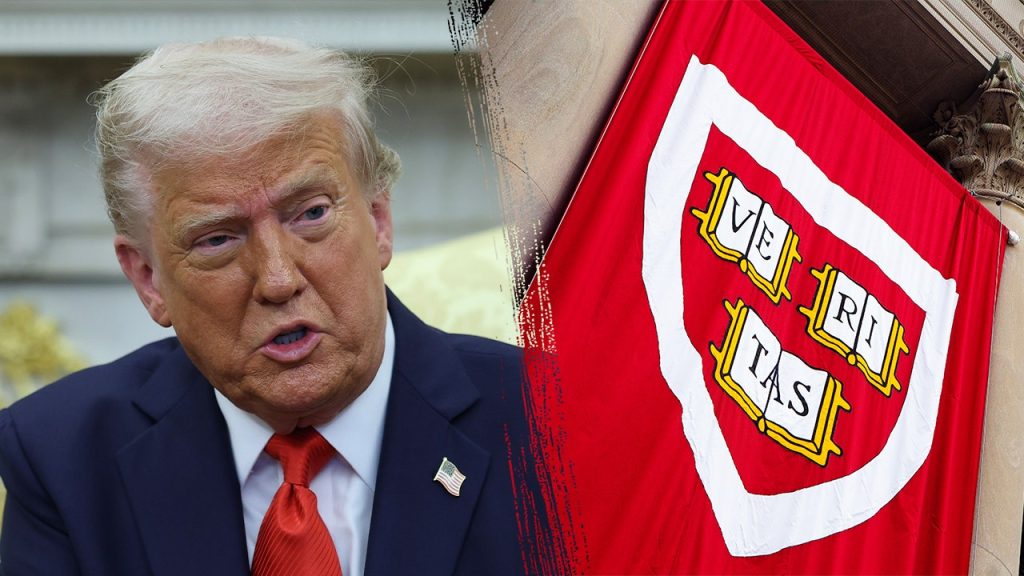In a significant escalation of tensions between former President Donald Trump and Harvard University, Trump announced plans on Friday to revoke the institution’s tax-exempt status. This decision follows allegations that Harvard has failed to adequately address antisemitism on its campus. The move is part of Trump’s broader initiative to challenge universities that, in his view, do not align with certain political values. The implications of this conflict raise questions about educational governance and the role of federal funding in private institutions.
| Article Subheadings |
|---|
| 1) Trump’s Accusations Against Harvard |
| 2) The Administration’s Demands |
| 3) Harvard’s Response |
| 4) Broader Implications for Universities |
| 5) Legal Actions and Future Prospects |
Trump’s Accusations Against Harvard
On Friday, Trump accused Harvard University of harboring ideologies he deemed “woke” and “Radical Left,” suggesting that these views contribute to a failure in fostering what he considers an educational environment suitable for future leaders. He specifically criticized the university’s handling of antisemitism, stating, “It’s what they deserve!” These accusations are not new as Trump has been vocal about his dissatisfaction with elite educational institutions, claiming they promote divisive ideologies. He indicated that federal funding is not a right for institutions that do not align with the values of the country and called Harvard a “JOKE,” asserting it teaches “Hate and Stupidity.”
The Administration’s Demands
In an official letter sent on April 11, the Trump administration detailed several demands directed at Harvard University. The letter, addressed to Harvard President Dr. Alan Garber and Harvard Corporation lead member Penny Pritzker, accused the institution of failing to comply with civil rights laws. It demanded reforms in governance, leadership, and hiring practices by August 2025, stressing the need for a shift in how international admissions are handled. The administration’s position is that Harvard should not admit students perceived as hostile to American values or supportive of terrorism and antisemitism. The letter outlined the consequences of non-compliance, including potential funding cuts, highlighting a contention that encompasses both educational philosophy and political accountability.
Harvard’s Response
Harvard University has firmly rejected the demands set forth by the Trump administration. In a public statement, President Dr. Alan Garber emphasized the importance of academic freedom, arguing that no government should dictate the educational curriculum, hiring practices, or the inherent academic inquiry of private universities. Despite threats of funding cuts, Harvard has voiced its commitment to maintaining its principles, which are often seen as at odds with the Trump administration’s approach to governance. This defiance from Harvard was met with further retaliation from the administration, which froze approximately $2.2 billion in federal funding, with rumors of another billion-dollar cut circulating.
Broader Implications for Universities
This controversy between Trump and Harvard is symptomatic of larger currents in the political landscape concerning higher education. Trump’s statements and decisions reflect a pervasive push against what some perceive as elitism and indoctrination in universities. The move to revoke tax-exempt status could have significant repercussions for many educational institutions across the nation, especially those perceived as antagonistic toward conservative viewpoints. The implications of such actions could result in a chilling effect on academic discourse, as institutions may become wary of exercising academic freedom for fear of governmental repercussions.
Legal Actions and Future Prospects
After the administration’s decision to freeze funding, Harvard University filed a lawsuit against the Trump administration. The university’s legal team described the funding freeze as “unlawful,” asserting that it undermined the institution’s autonomy and integrity. As the legal battle unfolds, the outcome may set a precedent for how government agencies can interact with educational institutions in matters of funding and governance. This case could bear ramifications not just for Harvard but for other universities who find themselves in similar positions, navigating the intersection of politics and education in an increasingly polarized environment.
| No. | Key Points |
|---|---|
| 1 | Trump publicly declares intent to revoke Harvard’s tax-exempt status. |
| 2 | Administration accuses Harvard of failing to address antisemitism. |
| 3 | Harvard refuses compliance, citing academic freedom as a priority. |
| 4 | Funding implications could affect educational institutions nationwide. |
| 5 | Lawsuit filed by Harvard against the Trump administration over funding freeze. |
Summary
The escalating conflict between former President Trump and Harvard University signifies a critical moment in the dialogue surrounding higher education, ideological freedom, and government oversight. Trump’s call to revoke Harvard’s tax-exempt status arises from accusations of antisemitism and perceived ideological indoctrination, amidst broader political motivations. The administration’s aggressive stance and Harvard’s rejection of demands set the stage for a complex legal landscape, influencing not only the institution’s future but the future of academic freedom across the United States.
Frequently Asked Questions
Question: What are the implications of revoking tax-exempt status?
Revoking tax-exempt status could result in significant financial losses for a university, impacting its ability to fund programs, scholarships, and operational expenses.
Question: How has Harvard responded to the accusations of antisemitism?
Harvard has consistently denied the claims of antisemitism, highlighting its commitment to diversity and inclusion while defending its academic freedom against governmental intervention.
Question: What does this conflict indicate about the future of higher education in the U.S.?
This conflict reveals a growing polarization in educational governance and could signal the emergence of more stringent governmental oversight of universities, particularly in relation to ideological content and student admissions.


